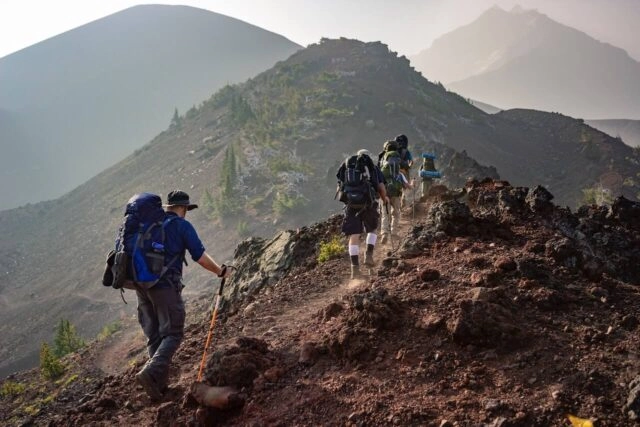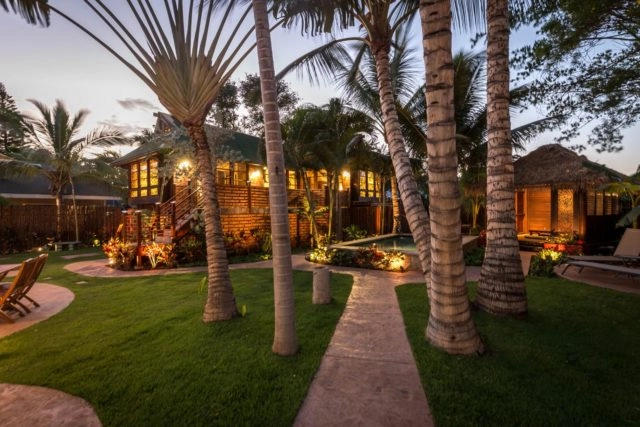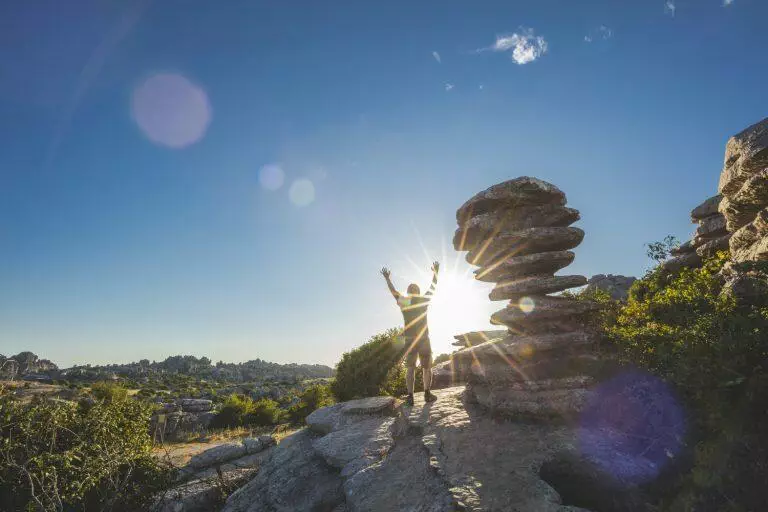When you hear the word “therapy,” it’s likely your brain conjures up an image of a psychotherapist sitting with a patient, verbally guiding them toward better mental health. The last thing that comes to mind is hiking through harsh terrain or swinging through a high ropes course. Fortunately, we’ve come a long way since the days of Freud! In the last several decades, this discipline has expanded to include a plethora of different models—adventure therapy is one of them.
Adventure therapy seeks to take you out of your comfort zone, helping you grow through cooperation, challenges, and being immersed in the natural world. It can be immensely helpful to those who suffer from addictions or mental health disorders. While talking therapy is often a fundamental component of recovery, adventure therapy can achieve what’s beyond its limits. So grab your hiking books, steel your resolve, and let’s explore this exciting approach!
What is Adventure Therapy?
Adventure therapy emerged from the broader field of experiential therapy developed in the 1940s and 50s. Experiential therapy was based on the belief that individuals learn and grow most effectively through direct, active experience.
It wasn’t until the 1970s that Project Adventure brought the concept to prominence, applying adventure-based activities in therapeutic settings.
Employing a multifaceted approach, adventure therapy uses outdoor activities to facilitate personal growth, self-discovery, and healing. It’s designed to engage individuals, families, and groups on physical, cognitive, emotional, and behavioral levels. Ultimately, this comprehensive engagement is integral to the success of the therapy, and key to fostering lasting change.
A significant influence on adventure therapy is the Outward Bound process model. Using novel environments and group settings, it empowers participants to challenge and overcome self-limiting beliefs, thereby expanding their potential for self-development.
The efficacy of the Outward Bound process has been demonstrated by a huge body of research. One such study, involving participants who underwent a 21-day Outward Bound course, resulted in reduced recidivism (the likelihood of a person committing a crime again). Amazingly, these outcomes were more successful than those of teens participating in an intensive outpatient therapy program.
By drawing from the Outward Bound process model and focusing on holistic engagement, adventure therapy emerges as an effective tool for promoting positive behavioral change, self-confidence, and a sense of accomplishment. It may not be as well-known as other forms of psychotherapy, but its transformative potential may soon make it a mainstay of recovery treatment.
The Core Principles of Adventure Therapy
Published in 2020, and backed by current research, Adventure Therapy: Theory, Research, and Practice is a foundational text on the subject. Its authors outline seven primary principles that are fundamental to this approach. Not only do these shape the flexible framework of adventure therapy, but also contribute to its success in treating a wide range of issues, including addiction recovery.
1. Action-Centered Therapy
Unlike traditional therapy conducted in enclosed rooms, adventure therapy invites individuals into the great outdoors. This holistic environment allows therapists to observe more than just spoken words, including important non-verbal cues and body language.
2. Unfamiliar Environment

Disrupting your comfort zone is fundamental to this therapy. When you’re introduced to new surroundings, and forced (with guidance) to adapt to them, you can cause an inner shift; one that can help break down resistance to change, fostering openness to new perspectives and behaviors.
3. Climate of Change
A primary goal of adventure therapy is to get you accustomed to eustress (positive stress). As opposed to distress (negative stress) eustress can be a powerful motivator. Ultimately, this approach helps you reframe your perspective of stress, allowing you to overcome what may have been formerly holding you back, and helping you build resilience.
4. Enhanced Assessment Capabilities
Observing individuals in a natural setting provides therapists with a more comprehensive understanding of their behaviors and patterns. This outdoor context often reveals aspects that may not surface within the confines of a therapy room.
5. Small Group Development

Adventure therapy often incorporates group activities, promoting a sense of community. This group interaction fosters empathy, communication skills, and a better understanding of others’ needs.
6. Emphasis on Successful Behaviors
Unlike many therapeutic approaches that focus on deficits or dysfunctional behaviors, adventure therapy highlights strengths and successful behaviors. This positive reinforcement can inspire confidence and reinforce the potential for personal growth.
7. Altered Role of the Therapist
In adventure therapy, therapists participate in the same challenges as their clients. In conventional therapy, the therapist and patient can get too invested in their assigned roles, thereby limiting the effectiveness of the treatment. Adventure therapy levels the playing field, enhancing the therapeutic alliance and promoting open communication.
Types of Adventure Therapy
The great thing about this approach is, as long as you adhere to the above tenets, your options are limitless. The unfamiliar, unpredictable, and explorative are core aspects, so the world really is your oyster!
However, while the treatment is flexible, there are some popular forms:
Wilderness Therapy

This involves extended trips into the wilderness where you’ll learn survival skills and confront the challenges of the natural environment. The remote setting offers a break from daily distractions, providing space for healthy introspection. The natural environment serves as a therapeutic tool in itself, providing a calming, restorative setting that can aid mental and emotional wellbeing. Removed from the pressures of everyday life, you have the opportunity to reflect on your behaviors, relationships, and personal struggles.
Adventure-based Counseling
This therapy utilizes physically engaging activities (such as high ropes courses or team challenges) to encourage personal development and team building. It’s a dynamic approach that integrates the thrill of adventure with the transformative power of therapy, making it an engaging and effective tool for personal development and healing. In many ways, the challenging and exhilarating activities serve as metaphors for real-life challenges, allowing you to explore your behaviors, attitudes, and emotions in a safe, supportive environment.
Equine-assisted Therapy

There’s something undeniably mysterious and majestic about horses. This approach involves interacting with the beautiful creatures and tapping into their healing power. Among other benefits, it helps to develop empathy, patience, and emotional awareness. What’s more, it’s especially impactful for those with addiction issues. If you’re suffering from feelings of isolation or distance, equine therapy can help rekindle a much-needed sense of connection and love.
Therapeutic Sailing
Ahoy! Time to take to the seas. Sailing may not be easy but it is rewarding, requiring a blend of physical activity, problem-solving, and teamwork. As you and your group learn to operate a sailboat, you must adapt to changing conditions, make quick decisions, and collaborate effectively with each other. These experiences can build resilience, enhance communication skills, and foster a sense of self-confidence. Moreover, the open sea can have a calming, therapeutic effect—the rhythmic sound of the waves and the vastness of the ocean can provide an ideal space to reflect.
The Benefits of Adventure Therapy
Adventure therapy is more than just a fun break from routine—it offers tangible benefits for those in recovery. Far from a fad, research continues to reinforce the transformative power of this approach. This 2013 meta-analysis of adventure therapy outcomes concluded:
“The results indicate that adventure therapy programs are moderately effective in facilitating positive short-term change in psychological, behavioural, emotional, and interpersonal domains and that these changes appear to be maintained in the longer-term.”
There are myriad benefits to adventure therapy but they aren’t set in stone. Needs vary from person to person and what works for you might not work for another. That being said, its healing potential is so broad that nearly everyone can benefit from it.
Enhanced Self-Esteem
When you successfully navigate a difficult trail or conquer the wave, these aren’t just physical feats—they’re powerful affirmations of your capabilities. Every challenge you overcome, every fear you face head-on, adds a building block to your self-esteem. Ultimately, you’ll realize that the strength, courage, and resilience needed were already within you, waiting to be harnessed. As this research shows, adventure therapy is an effective means to rebuild your self-esteem.
Improved Interpersonal Skills
In most cases, adventure therapy involves teamwork, enabling you to grow your communication and collaboration skills. If you’ve become used to isolation, or have fallen out with friends and family, this prospect can seem daunting. However, when you step over the threshold, you’ll soon be bonding over activities or difficult tasks with those sharing similar struggles. Ultimately, few therapies are as effective at building your social confidence and forming new connections.
Stress Reduction

Adventure therapy often puts you in natural settings. Beautiful, serene environments can help to lower cortisol and promote a deep sense of relaxation. A meta-analysis backs up this experience, finding that exposure to nature can lead to significant decreases in heart rate and blood pressure. What’s more, this sense of palpable calm serves as a fitting backdrop for harnessing eustress.
Increased Resilience
Each challenge you face, whether it’s navigating a tricky trail or weathering a sudden storm, teaches you to adapt, persevere, and bounce back stronger. A 2016 study confirms this, showing that adventure therapy significantly enhances resilience. So, remember, with every step you take, every hurdle you overcome, you’re not just surviving— you’re building a stronger, more resilient self.
Emotional Growth
You may not realize it at the time, but whether you’re expressing joy at reaching a summit or sharing your fears around a campfire, you’re growing emotionally. And it’s not just a feeling; therapeutic wilderness programs have been found to improve emotional intelligence in young adults. This study assessed the efficacy of outdoor adventure intervention to facilitate emotional intelligence and concluded:
“The results indicated that participation in outdoor intervention led to a sustainable increase in the overall EQ (emotional intelligence) scores of participants as well as in certain subskills of EQ, namely intrapersonal skills, adaptability and general mood.”
How Maui Recovery Can Help

At Maui Recovery, we have long believed in the transformative power of adventure—and we have the results to prove it. That’s why we offer a range of experiential treatments, including adventure therapy and equine therapy, as part of our addiction recovery program.
Nestled amidst the breathtaking beauty of Maui, our luxury center provides a nurturing, empowering environment. This serves as the base from which you’re able to tap into your inner strength and learn to navigate life’s challenges.
Whether you’re learning to trust a horse or pushing your limits on an outdoor adventure, our experienced therapists and supportive community are here to guide you every step of the way. As you connect with nature and overcome inner struggles, you’ll soon discover the incredible potential within you.
The journey may not always be easy, but the rewards—a renewed sense of self, improved emotional well-being, and the newfound skills to thrive — are priceless.
To find out more about our recovery programs, please contact us for a confidential, no obligation conversation with one of our team.









